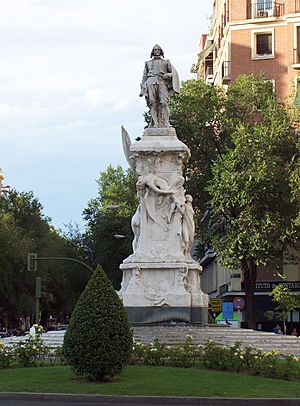Monument to Quevedo (Madrid) facts for kids
 |
|
| Coordinates | 40°26′01″N 3°42′15″W / 40.433627°N 3.704241°W |
|---|---|
| Location | Glorieta de Quevedo, Madrid, Spain |
| Designer | Agustín Querol Fernando Cruz Solís (replica of the original pedestal) |
| Material | Marble, limestone |
| Length | 9.00 m |
| Width | 2.50 m |
| Height | 2.50 m |
| Opening date | 5 June 1902 |
| Dedicated to | Francisco de Quevedo |
The Quevedo monument, also known as the Monument to Quevedo, is a famous statue in Madrid, Spain. It was created by the artist Agustín Querol. This monument honors Francisco de Quevedo, who was a very important Spanish writer during the Baroque era.
Contents
Discovering the Quevedo Monument
This section tells you about the history and features of the Quevedo monument. It is a significant piece of public art in Madrid.
How the Monument Was Built
The monument was designed by Agustín Querol. It was first shown to the public on June 5, 1902. The ceremony happened in a place called Plaza de Alonso Martínez. Bad weather had delayed the opening several times before this date.
This unveiling was part of a big event in Madrid. Many new outdoor sculptures were revealed at that time. This was to celebrate King Alfonso XIII becoming an adult. Other famous people honored with statues included Lope de Vega and Goya.
What the Statue Looks Like
The main part of the monument is a standing statue of Quevedo. It is made from beautiful Carrara marble. You can see him wearing his special glasses, called quevedos in Spanish. These glasses were named after him! He also has the cross of Saint James on his chest.
Around the bottom of the statue, there are four other sculptures. These figures represent different ideas. They are Satyre, Poetry, Prose, and History. They are made of limestone and surround the main part of the monument.
Changes Over Time
The original base, or pedestal, of the monument was made from Novelda limestone. By the 1960s, this stone had started to wear away. So, a new pedestal was made. It was a copy of the old one but used stronger stone from Atarce. This new part was sculpted by Fernando Cruz Solís.
Also in the 1960s, the monument was moved. It found its new home in the Glorieta de Quevedo, where it stands today. In 1999, a new feature was added to the base. A fountain made of granite from Badajoz was installed there.
See also
 In Spanish: Monumento a Quevedo (Madrid) para niños
In Spanish: Monumento a Quevedo (Madrid) para niños
 | Aaron Henry |
 | T. R. M. Howard |
 | Jesse Jackson |

